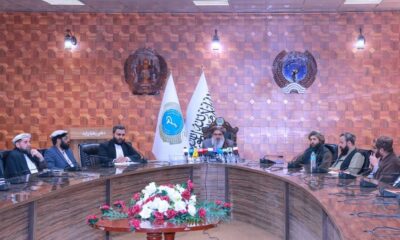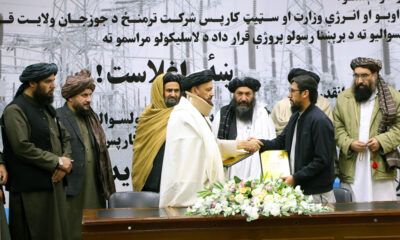Latest News
US slaps sanctions on two former Afghan officials for corruption
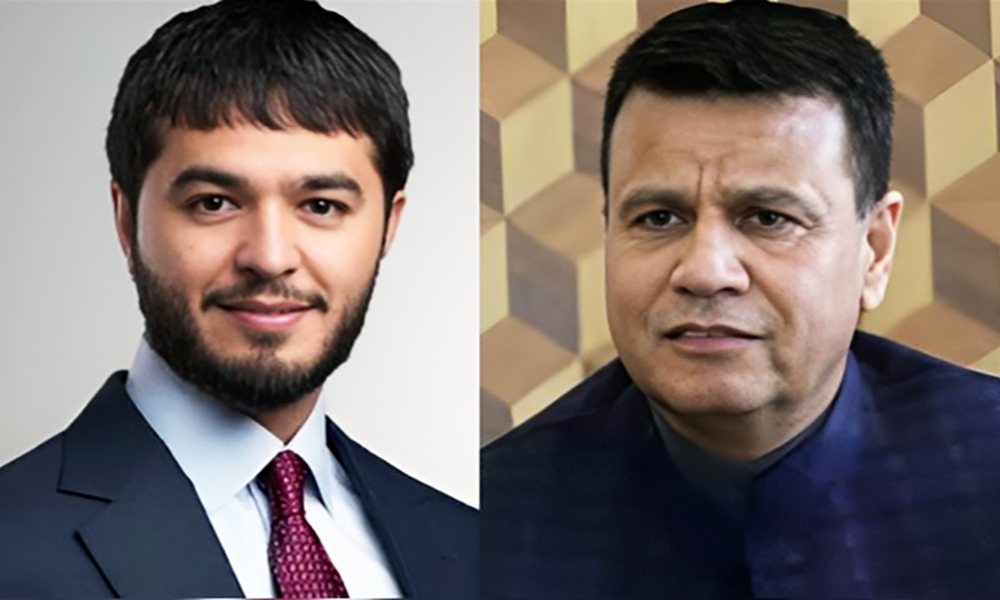
The United States said on Monday it put sanctions on two former Afghan officials and 44 related entities for a corruption scheme in which they allegedly siphoned off millions of dollars in U.S. government funds meant for Afghan security forces, Reuters reported.
The Treasury named the two as Mir Rahman Rahmani, who served in parliament before the Afghan government collapsed in 2021 when U.S. forces withdrew and the Islamic Emirate took over, and his son Ajmal Rahmani, another legislator nicknamed “Armored Ajmal” for his business selling bulletproof vehicles to the Kabul elite.
“Through their Afghan companies, the Rahmanis perpetrated a complex procurement corruption scheme resulting in the misappropriation of millions of dollars from U.S. Government-funded contracts that supported Afghan security forces,” the Treasury Department said in a statement.
The sanctions, imposed one day after Human Rights Day, block U.S. assets of those targeted and generally bars Americans from dealing with them. Those who engage in certain transactions with them also risk being hit with sanctions, Reuters reported.
The sanctions come under an executive order that builds on and implements the Global Magnitsky Human Rights Accountability Act and targets perpetrators of serious human rights abuse and corruption around the world.
In its statement, the Treasury described several alleged schemes under which the Rahmanis enriched themselves.
It accused them of rigging bids for contracts to provide fuel to the Afghan National Defense and Security Forces (ANDSF), artificially inflating prices.
“In 2014, several families involved in the fuel business, including the Rahmanis, colluded to drive up the price of fuel on U.S.-funded contracts by more than $200 million and eliminate competitor bids,” the Treasury Department said.
In another scheme, it accused them of fraudulently importing and selling tax free fuel and also of under-delivering fuel they were under contract to supply, read the report.
“After bribing their way into the Afghan Parliament, the Rahmanis used their official positions to perpetuate their corrupt system,” the Treasury added.
The Treasury also sanctioned 44 companies, 23 of them German, eight Cypriot, six Emirati, two Afghan, two Austrian, two Dutch and one Bulgarian.
Separately, the White House issued a proclamation expanding the U.S. government’s authority to limit the entry of foreigners involved in significant corruption as well as their family members, Reuters reported.
Latest News
Afghanistan exports 10 containers of batteries to Saudi Arabia and UAE for first time

The Office of the Governor of Herat announced on Tuesday that for the first time, a shipment of ten containers of batteries, of various sizes, manufactured at the local industrial park, has been exported to Saudi Arabia and the United Arab Emirates.
According to a statement, the batteries were dispatched in the presence of the Deputy Minister of Industry and Trade, local officials, and industrialists.
The Deputy Minister of Industry and Trade stated that over the past four years, significant progress has been made in the industrial sector, and with the establishment of the Islamic Emirate, conditions for investment in domestic production have been created.
The Herat local administration welcomed this initiative, describing the export of domestic products as an important step in strengthening the local and national economy. It assured that providing full support to industrialists, offering necessary facilities, and creating a suitable environment for the development of production and exports remain top priorities for the administration.
Latest News
Power project signed to electrify 47,000 homes in Jawzjan
According to MoEW, the project will be funded through revenues from Afghanistan’s mines and will provide electricity to around 47,000 families.
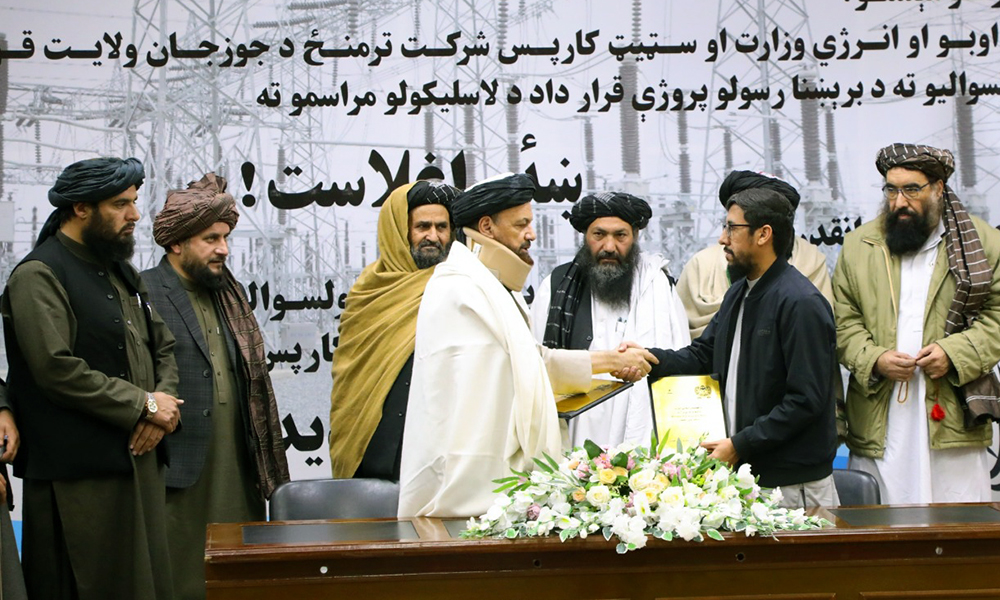
The Ministry of Energy and Water (MoEW) on Tuesday signed a major power supply project worth over 1.8 billion afghanis with domestic firm State Corps to provide electricity to Qush Tepa and Darzab districts in northern Jawzjan province.
The contract signing ceremony, held at the Government Information and Media Centre, was attended by Deputy Prime Minister for Economic Affairs Mullah Abdul Ghani Baradar and senior government officials.
Mawlawi Abdul Rahman Rahmani, Director General of Renewable Energy at MoEW, said the $28.4 million project (equivalent to 1.886 billion afghanis) aims to ensure nearly all households in Qush Tepa and Darzab have access to electricity.
He explained that the project involves constructing an 85.4-kilometre transmission line from Shiberghan, the provincial capital, building substations, and establishing electricity distribution networks in both districts.
Alauddin Salim, representing State Corps, described the initiative as “crucial” and said it is expected to be completed within three years. He highlighted that domestic firms, like State Corps, are more committed than foreign companies to project delivery.
According to MoEW, the project will be funded through revenues from Afghanistan’s mines and will provide electricity to around 47,000 families. The ministry urged the company to ensure timely completion with high quality standards.
Latest News
Pakistani cleric condemns lifetime immunity for Army Chief as un-Islamic
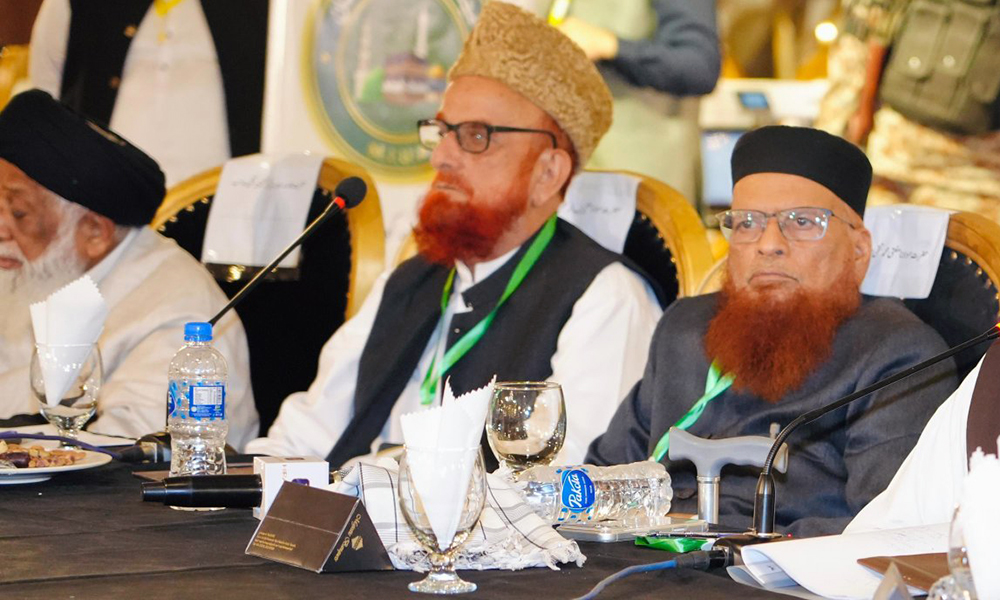
Prominent Pakistani religious scholar Mufti Taqi Usmani has strongly criticised moves to grant lifetime immunity to Pakistan’s Army Chief, General Asim Munir, describing such protection from judicial accountability as contrary to Islamic principles.
Speaking at a public gathering on Monday, Mufti Usmani said that Islam does not place any individual above the law, stressing that rulers, military leaders and ordinary citizens are equally accountable for their actions. He emphasised that justice and accountability form the foundation of an Islamic system, and that permanent immunity for powerful figures violates the spirit of Sharia.
The cleric warned that creating legal distinctions between state officials and the general public undermines public trust and fosters injustice within society. He urged state institutions to adhere to Islamic values when making political and military decisions, particularly those affecting governance and accountability.
Mufti Usmani’s remarks come amid growing debate in Pakistan over the role of the military in state affairs and the expanding authority granted to senior army officials. The issue has drawn heightened public and political attention in recent weeks, with critics arguing that excessive protections weaken democratic institutions and the rule of law.
-

 Latest News3 days ago
Latest News3 days agoAfghanistan signs 30-year deal for marble mining in Daikundi
-

 Latest News5 days ago
Latest News5 days agoAfghan border forces prevent illegal entry of hundreds into Iran
-

 Latest News4 days ago
Latest News4 days agoPakistan summons Afghan diplomat over deadly attack in North Waziristan
-

 Latest News4 days ago
Latest News4 days agoAfghan health minister calls for medical cooperation between Kabul and New Delhi
-

 Latest News5 days ago
Latest News5 days agoJapan allocates nearly $20 million in humanitarian aid for Afghanistan
-

 Latest News4 days ago
Latest News4 days agoKarzai urges reopening of girls’ schools and universities for Afghanistan’s bright future
-
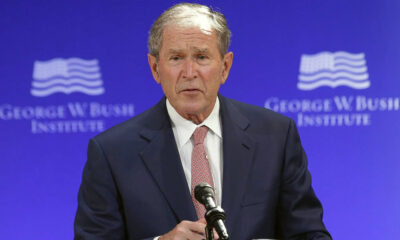
 Latest News3 days ago
Latest News3 days agoBush Institute criticizes Trump administration’s Afghan immigration freeze
-

 Health5 days ago
Health5 days agoIndia issues over 200 medical visas to Afghans in last four months






